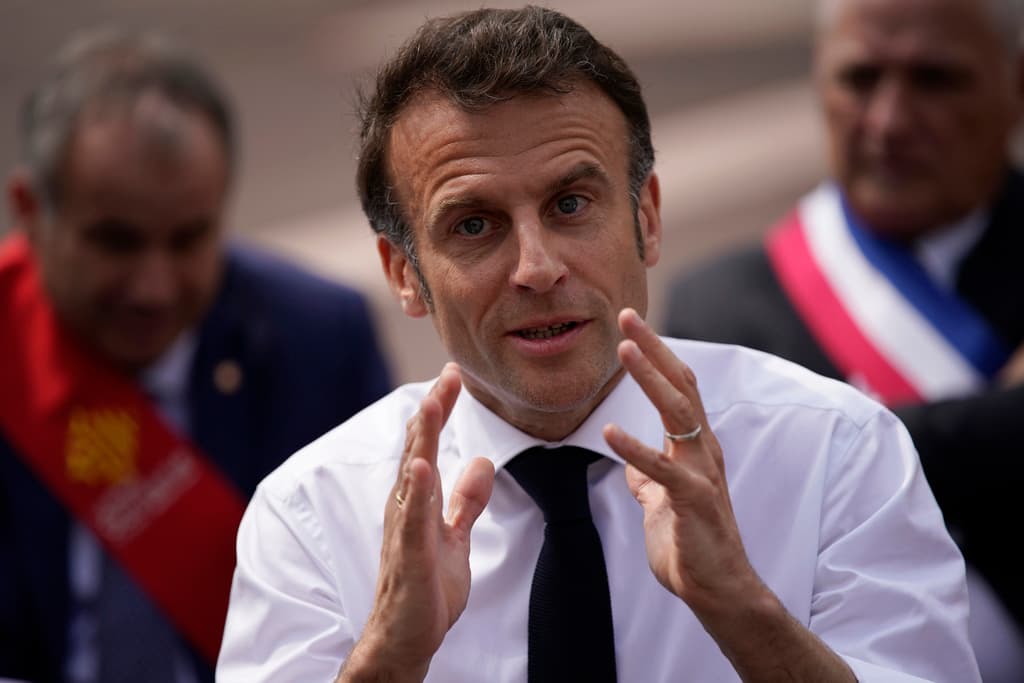Channeling Charles de Gaulle, Macron Thumbs His Nose at NATO
France snubs the secretary-general’s desire for a liaison office at Tokyo in a fresh headache for Ukraine.

The top dog at Paris just made Vladimir Putin’s day. President Macron, through a representative, nixed a recent proposal that would have seen the North Atlantic Treaty Organization open a liaison office in Japan.
It comes after Mr. Macron said last week that expanding NATO’s “geography” would be a “big mistake.” That evoked memories of President de Gaulle’s decision in 1966 to pull France out of NATO’s integrated command structure — a move not reversed until 2009, when President Sarkozy changed course.
At Tokyo in February, NATO’s secretary-general, Jens Stoltenberg, said that among the alliance’s partners none is closer or more capable than Japan. That language appeared to rankle Mr. Macron. According to Agence France-Presse, an unnamed French official said that “NATO (stands for) North Atlantic, and both article V and article VI (in its statutes) clearly limit the scope to North Atlantic.”
That can be only music to the ears of the Russian strongman, for whom the war on Ukraine is not just a land grab but also a proximate battle against the West in general. Seen in that light, the expansion of the military alliance has long been a thorn in Russia’s side, an animosity that dates back decades to the formation of the Warsaw Pact during the Cold War.
President Zelensky has pressed for Ukraine’s membership in NATO as soon as circumstances permit, a cause championed by many current members, especially Britain. Yet expansion of NATO eastward to include Ukraine is a prospect that has met with a cold shoulder from Budapest and a lukewarm response at best from Paris.
That same French official was quoted in the Financial Times as saying, “There is no NATO liaison office in any country” in the Asian region, and “if NATO needs situational awareness in the region it can use the embassies designated as point of contact.”
Zut alors.
Monsieur Macron, whose standing in the French polls has not ceased to ebb in recent months, has frequently spoken of what he perceives to be a need for Europe to hammer out a more independent security architecture and moreover one that should give guarantees for Russia as well as Ukraine. He is also reluctant to risk exacerbating existing tensions between NATO and Beijing.
Meanwhile, Mr. Stoltenberg last week said that “what happens in Asia matters for Europe and what happens in Europe matters for Asia, and therefore it is even more important that NATO allies are strengthening our partnership with our Indo-Pacific partners.”
As if to underscore that assessment, on Tuesday the Russian and Communist Chinese armed forces conducted joint patrols over not only the East China Sea but also over the Sea of Japan.
Relations between the EU and China have become increasingly testy of late. In a terse statement also reported by the Financial Times, the Chinese foreign ministry spokesman, Wang Wenbin, said that “Asia lies beyond the geographical scope of the North Atlantic.”
Last month, the Guardian reported that the NATO office at Tokyo was already slated to open in 2024, and Chinese misgivings are not likely to stand in the way. Yet when Mr. Macron gets to some old-fashioned Gallic brooding, look out. Liaison may be a French word, but on this fractured global stage a new NATO liaison office in Japan is far from being a fait accompli.

